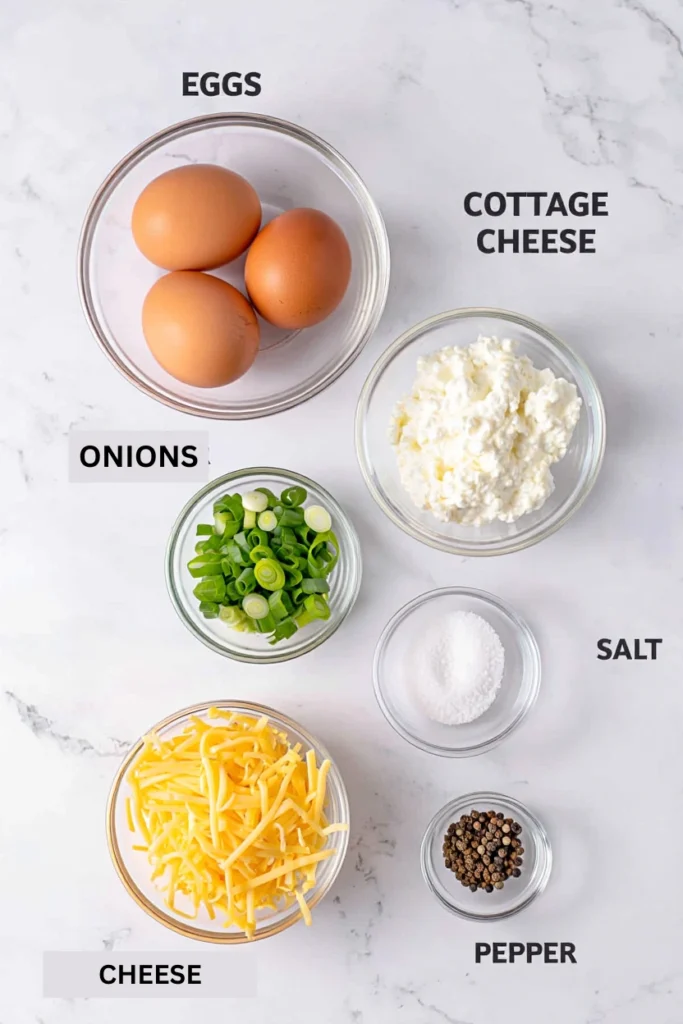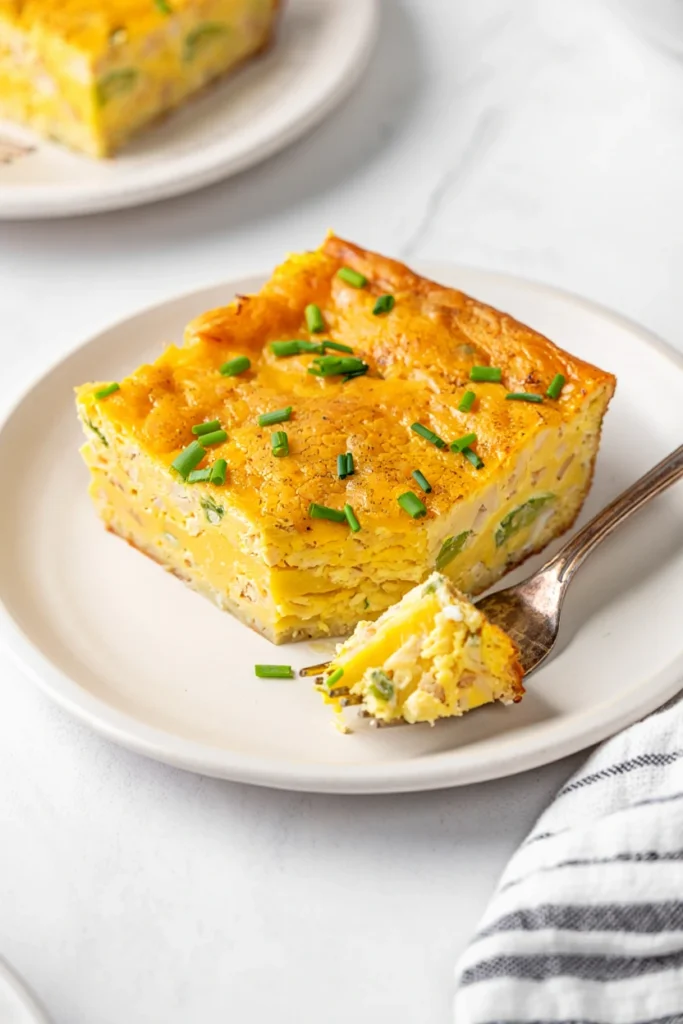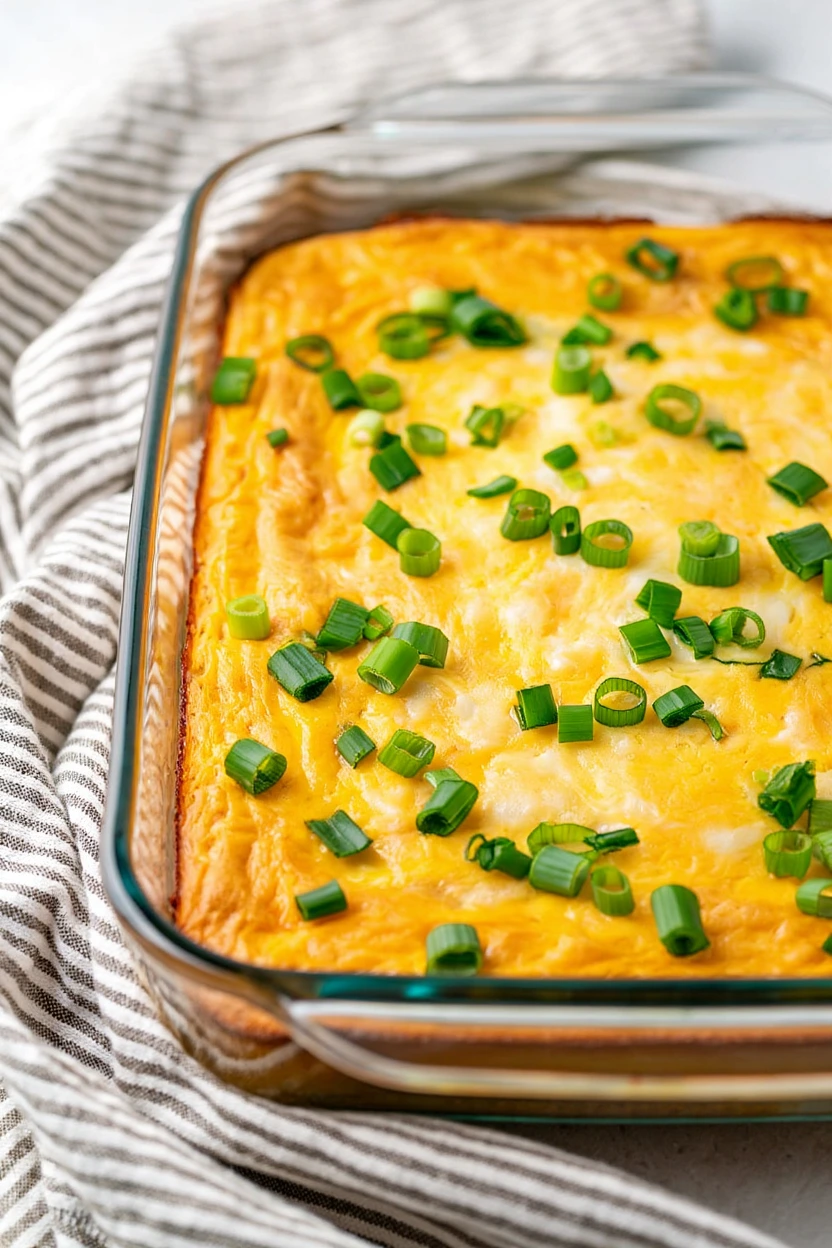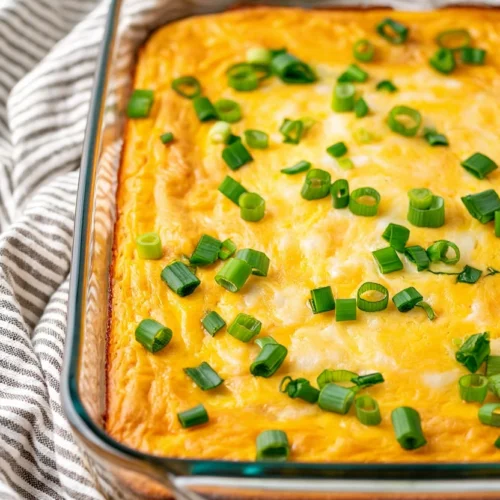Baked cottage cheese eggs combine two protein powerhouses into one simple, delicious meal. This dish transforms ordinary eggs and cottage cheese into a fluffy, savory breakfast that keeps you full for hours. The recipe requires minimal prep time but delivers maximum flavor. The eggs bake up with a soufflé-like texture while the cottage cheese adds creaminess and extra protein. Perfect for busy mornings, meal prep, or a nutritious brunch option, these baked cottage cheese eggs work well for anyone looking to add more protein to their diet without complicated cooking techniques.
Table of Contents
Reasons to Try Baked Cottage Cheese Eggs
Baked cottage cheese eggs deserve a spot in your breakfast rotation for many good reasons:
- High protein content – The combination of eggs and cottage cheese creates a meal with approximately 20-25 grams of protein per serving.
- Quick preparation – You can mix the ingredients in under 5 minutes, then let your oven do the work.
- Customizable – The basic recipe serves as a canvas for your favorite herbs, spices, and vegetables.
- Budget-friendly – Eggs and cottage cheese cost less than many other protein sources.
- Meal-prep friendly – You can make a batch ahead of time and refrigerate portions for quick breakfasts throughout the week.
- Light yet filling texture – The eggs bake up fluffy while the cottage cheese creates a creamy consistency that satisfies without heaviness.
Where did Baked Cottage Cheese Eggs come from?
Baked cottage cheese eggs have roots in several culinary traditions that value protein-rich, simple foods. Similar egg and cheese bakes appear in Eastern European cuisine, where cottage cheese (twaróg) features prominently in many dishes. The modern version gained popularity during the fitness and protein-focused diet movements of the 2010s, when high-protein breakfasts became valued for their satiety and nutritional benefits. This recipe represents a practical fusion of old-world cooking techniques with contemporary nutritional goals. Home cooks looking for efficient ways to increase protein intake helped spread various versions across cooking blogs and social media platforms.
Ingredients Notes

Eggs: Use fresh, large eggs at room temperature for the best rise and texture. Farm-fresh eggs with bright orange yolks will enhance both the flavor and color of your dish.
Cottage cheese: Opt for full-fat or 2% cottage cheese for the creamiest results. Small or medium curd works well, but small curd blends more smoothly. Look for cottage cheese without additives or preservatives for the cleanest flavor.
Salt and pepper: Sea salt and freshly ground black pepper make a noticeable difference in the final taste.
Optional add-ins: Fresh herbs like chives, dill, or parsley brighten the flavor. Vegetables such as spinach, bell peppers, or cherry tomatoes add color, texture, and nutrients.
Seasoning options: Garlic powder, onion powder, paprika, or dried herbs like oregano can customize the flavor profile to your preferences.
How to Make Baked Cottage Cheese Eggs
- Preheat your oven to 350°F (175°C) and lightly grease a baking dish or individual ramekins with cooking spray or butter.
- In a large bowl, beat 6 large eggs until well combined.
- Add 1 cup of cottage cheese to the beaten eggs and mix well.
- Season with 1/4 teaspoon salt, 1/8 teaspoon black pepper, and any optional herbs or spices you prefer.
- If adding vegetables, fold in 1/2 cup of your prepared add-ins (chopped spinach, diced bell peppers, etc.).
- Pour the mixture into your prepared baking dish or divide evenly among ramekins.
- Bake in the preheated oven for 25-30 minutes for a large dish or 18-22 minutes for individual ramekins. The eggs should puff up and become golden on top, with the center set but still moist.
- Remove from the oven and let cool for 5 minutes before serving.
- Garnish with fresh herbs if desired and serve warm.
What You Must Know About Baked Cottage Cheese Eggs
Don’t overmix: Stir the ingredients just until combined. Overmixing can make the final texture dense rather than fluffy.
Watch the baking time: Overbaking will dry out the eggs. The dish is done when the center is just set but still slightly jiggly.
Room temperature ingredients work best: Cold eggs and cottage cheese straight from the refrigerator can extend cooking time and affect texture.
Drain excess liquid: If your cottage cheese seems watery, drain it in a fine mesh strainer before adding it to the eggs.
Let it rest: Allow the baked eggs to rest for at least 5 minutes after baking. This makes them easier to slice and serve.
Low and slow: Baking at a moderate temperature ensures even cooking throughout without burning the top.
Helpful Tips
Blend for smoothness: If you prefer a smoother texture without cottage cheese curds, blend the cottage cheese in a food processor or blender before mixing with the eggs.
Individual portions: Use a muffin tin to create single-serving portions that work well for meal prep.
Parchment paper: Line your baking dish with parchment paper for easy removal and cleanup.
Check for doneness: Insert a knife into the center—it should come out mostly clean with just a few moist crumbs.
Cold water bath: To prevent overcooking from residual heat, place the baking dish in a shallow pan of cold water after removing from the oven.
Variations and Substitutions
Mediterranean style: Add chopped olives, sun-dried tomatoes, feta cheese, and dried oregano.
Herb garden: Mix in 2-3 tablespoons of fresh chopped herbs like dill, parsley, chives, and basil.
Vegetable loaded: Incorporate sautéed mushrooms, spinach, and bell peppers for added nutrients.
Cheese lover’s: Add 1/4 cup of shredded cheddar, mozzarella, or Swiss cheese for extra richness.
Protein plus: Mix in 1/4 cup of chopped cooked chicken or turkey for even more protein.
Greek yogurt substitute: Replace half the cottage cheese with Greek yogurt for a tangier flavor.
Ricotta alternative: Substitute ricotta cheese for cottage cheese for a different texture.
Egg whites only: Use 10-12 egg whites instead of whole eggs for a lower-fat option.
Serving Suggestions for Baked Cottage Cheese Eggs
Serve baked cottage cheese eggs with:

- A side of fresh fruit for a complete breakfast
- Sliced avocado and cherry tomatoes for healthy fats and freshness
- Whole grain toast or English muffins for added fiber
- A simple green salad dressed with lemon juice and olive oil
- Roasted sweet potatoes for a hearty brunch option
- Fresh salsa or pico de gallo for a Mexican-inspired twist
- A dollop of Greek yogurt and a sprinkle of herbs
- Sautéed greens like kale or spinach for extra nutrients
Storage/Reheating
Storage: Keep leftovers in an airtight container in the refrigerator for up to 3 days.
Reheating: For best results, reheat individual portions in the microwave at 50% power for 1-2 minutes until just warmed through. Alternatively, reheat in a 325°F oven for 10 minutes. Avoid high heat which can make the eggs rubbery.
Freezing: This dish can be frozen in individual portions for up to 1 month. Thaw overnight in the refrigerator before reheating.
Frequently Asked Questions about Baked Cottage Cheese Eggs
Can I make baked cottage cheese eggs ahead of time?
Yes, you can prepare baked cottage cheese eggs up to 3 days in advance. Store them in an airtight container in the refrigerator and reheat individual portions when ready to eat.
How can I tell when my baked cottage cheese eggs are done?
The eggs are done when the edges are set and golden, the center is mostly firm but still slightly jiggly, and a knife inserted in the center comes out mostly clean. The internal temperature should reach 165°F.
Can I use egg whites only in this recipe?
Absolutely! Replace the 6 whole eggs with 10-12 egg whites for a lower-fat, higher-protein version. The texture will be slightly different but still delicious.
Is this recipe keto-friendly?
Yes, baked cottage cheese eggs are keto-friendly when made with full-fat cottage cheese. The dish is naturally low in carbohydrates and high in protein and healthy fats.
Can I substitute ricotta for cottage cheese?
Yes, ricotta makes a great substitute for cottage cheese in this recipe. It creates a slightly creamier texture and milder flavor profile.
Why did my baked eggs sink after removing them from the oven?
Some sinking is normal as the hot air inside the eggs cools. To minimize sinking, avoid opening the oven door during baking and make sure your eggs are at room temperature before mixing.
Similar Recipes:
Delicious Baked Cottage Cheese Eggs: Protein-Packed Breakfast Recipe
Ingredients
- 6 large eggs
- 1 cup cottage cheese 2% or full-fat
- 1/4 teaspoon salt
- 1/8 teaspoon black pepper
- Optional: 1-2 tablespoons fresh herbs chives, dill, or parsley
- Optional: 1/2 cup vegetables spinach, bell peppers, or tomatoes
Instructions
- Preheat oven to 350°F (175°C) and grease baking dish.
- Beat eggs in a large bowl.
- Add cottage cheese and mix well.
- Season with salt, pepper, and optional herbs or spices.
- Fold in any optional vegetables.
- Pour mixture into prepared baking dish.
- Bake for 25-30 minutes until puffed and golden.
- Let rest for 5 minutes before serving.
- Garnish and serve warm.
Notes
Nutrition Facts (Per Serving)
Based on 4 servings:- Calories: 165
- Protein: 17g
- Fat: 10g
- Saturated Fat: 4g
- Carbohydrates: 3g
- Fiber: 0g
- Sugar: 2g
- Sodium: 380mg
- Calcium: 120mg
- Iron: 1.2mg
Leave a Reply
Recipe Ratings
There are no reviews yet. Be the first one to write one.

